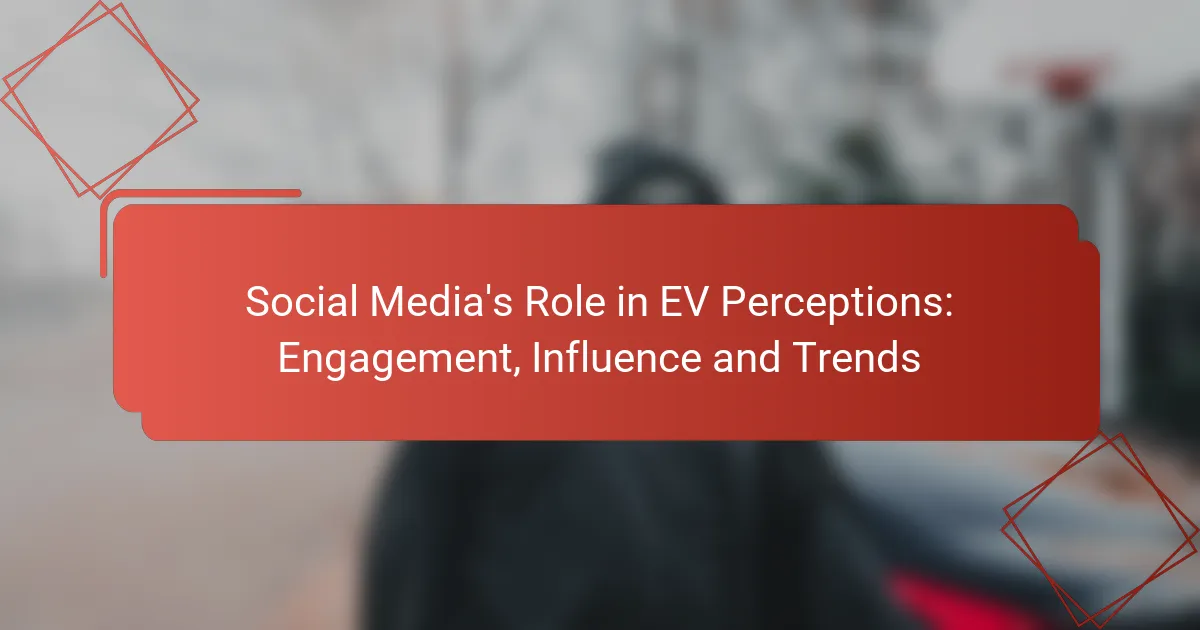Social media plays a crucial role in shaping perceptions of electric vehicles (EVs) by enabling information sharing and community engagement. Platforms such as Twitter, Instagram, and Facebook allow users to interact with brands, share personal experiences, and influence public sentiment regarding EV technology. By implementing effective engagement strategies, EV brands can cultivate loyal communities and enhance their overall brand perception.
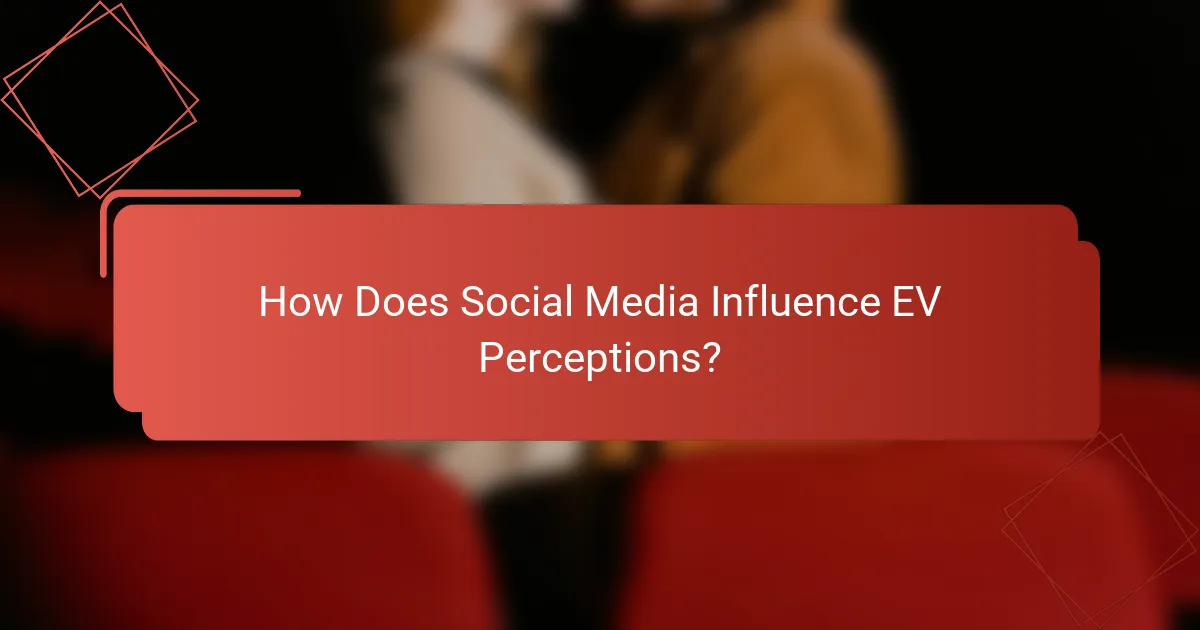
How Does Social Media Influence EV Perceptions?
Social media significantly shapes perceptions of electric vehicles (EVs) by facilitating information sharing and fostering community discussions. Through platforms like Twitter, Instagram, and Facebook, users can engage with brands, share experiences, and influence public sentiment about EV technology.
Increased brand awareness
Social media enhances brand visibility for EV manufacturers, allowing them to reach a broader audience. Companies can showcase their latest models, features, and innovations through targeted ads and engaging content, which helps establish a strong brand presence in the competitive automotive market.
For instance, a well-executed social media campaign can increase brand recognition by leveraging eye-catching visuals and compelling narratives, leading to higher consumer interest and potential sales.
Consumer engagement and feedback
Social media platforms provide a direct channel for consumers to engage with brands and share their opinions. This interaction allows companies to gather valuable feedback on their products and services, which can inform future developments and marketing strategies.
Encouraging user-generated content, such as reviews and testimonials, can further enhance credibility and trust among potential buyers, as they often rely on peer recommendations when considering EV purchases.
Shaping public opinion
Social media plays a crucial role in shaping public opinion about electric vehicles by facilitating discussions on sustainability, technology, and environmental impact. Influential voices and trending topics can sway perceptions, making EVs more appealing to a wider audience.
Campaigns that highlight the benefits of EVs, such as reduced emissions and lower operating costs, can effectively shift public attitudes, encouraging more consumers to consider transitioning to electric options.
Influencer marketing impact
Influencer marketing leverages the reach and credibility of social media personalities to promote electric vehicles. Influencers can effectively communicate the advantages of EVs to their followers, often leading to increased interest and sales.
Collaborating with influencers who align with the brand’s values can create authentic connections with potential customers, making the messaging more relatable and impactful.
Real-time information dissemination
Social media allows for the rapid dissemination of information regarding electric vehicles, including news, updates, and technological advancements. This immediacy helps consumers stay informed about the latest trends and developments in the EV market.
Brands can utilize social media to share real-time updates about product launches, promotions, and events, ensuring that their audience is always engaged and informed about their offerings.
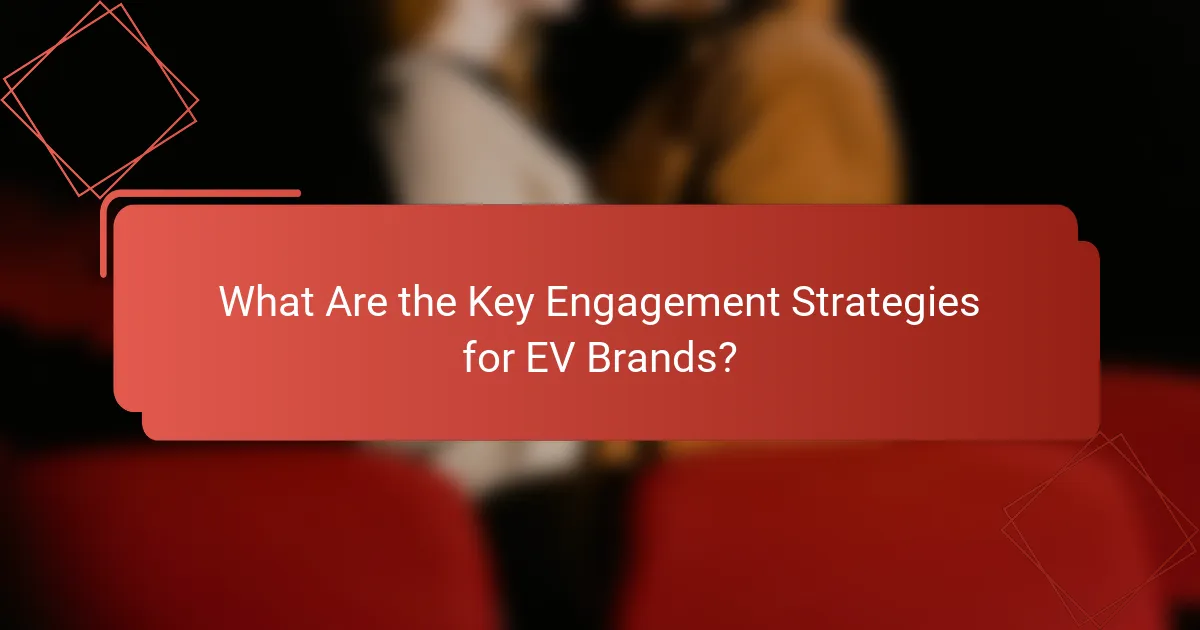
What Are the Key Engagement Strategies for EV Brands?
Effective engagement strategies for electric vehicle (EV) brands focus on fostering interaction, building communities, and leveraging content to enhance brand perception. By utilizing these strategies, brands can create a loyal customer base and positively influence public perception of EVs.
Interactive content creation
Interactive content, such as quizzes, polls, and augmented reality experiences, engages users and encourages them to learn more about EVs. This type of content can increase user retention and drive higher levels of participation, making it a powerful tool for brands. For instance, a quiz that helps users determine which EV model suits their lifestyle can enhance engagement and lead to more informed purchasing decisions.
Brands should prioritize creating visually appealing and easy-to-navigate interactive content. Consider using platforms that allow for seamless integration with social media to maximize reach and engagement.
Community building initiatives
Building a community around EVs involves creating spaces where enthusiasts and potential customers can connect, share experiences, and discuss topics related to electric vehicles. This can be achieved through online forums, social media groups, or local meetups. Engaging with users in these spaces fosters loyalty and encourages word-of-mouth promotion.
Brands can enhance community building by hosting events, such as test drive days or sustainability workshops, that bring people together and promote the benefits of EV ownership. These initiatives can create a sense of belonging and strengthen brand affinity.
Targeted advertising campaigns
Targeted advertising campaigns allow EV brands to reach specific demographics that are more likely to be interested in electric vehicles. By utilizing data analytics, brands can tailor their messaging to resonate with particular audiences, such as environmentally conscious consumers or tech enthusiasts. This focused approach can lead to higher conversion rates.
Brands should consider using platforms like Facebook and Google Ads to implement targeted campaigns. A/B testing different ad formats and messages can help identify what resonates best with the target audience, optimizing ad spend and improving overall effectiveness.
Utilizing user-generated content
User-generated content (UGC) is a valuable asset for EV brands, as it showcases real customer experiences and builds trust. Encouraging customers to share their stories, photos, and reviews on social media can amplify brand visibility and authenticity. UGC can be featured on the brand’s website or social media channels to further enhance engagement.
To effectively leverage UGC, brands should create campaigns that incentivize customers to share their content, such as contests or giveaways. Highlighting customer stories in marketing materials can also create a sense of community and encourage others to contribute their experiences.
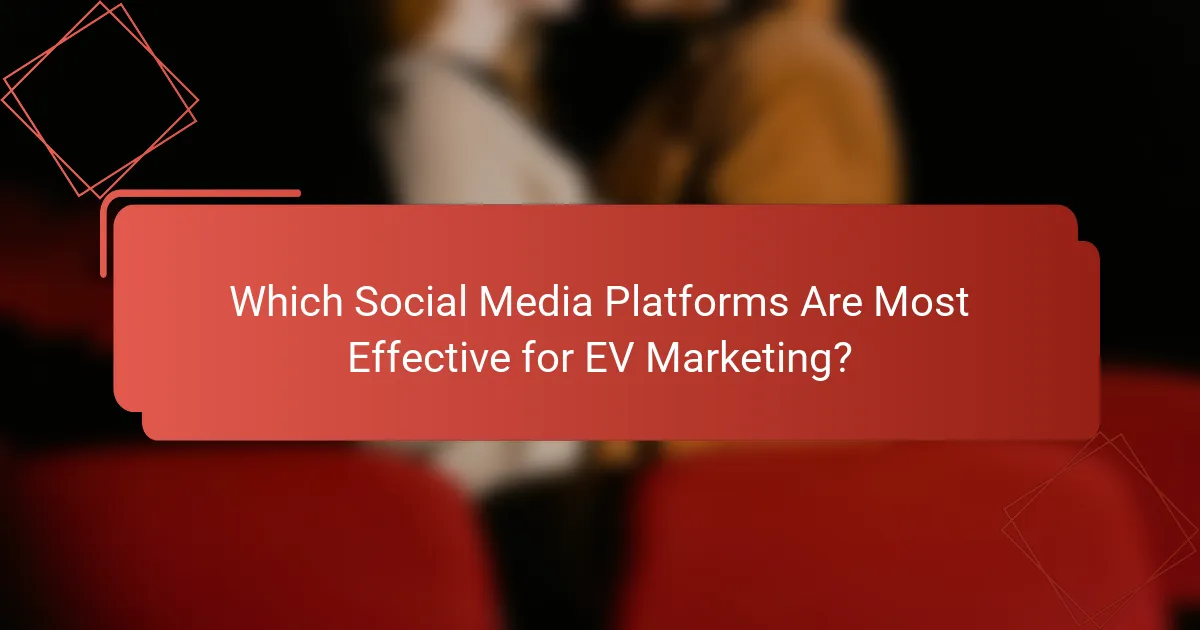
Which Social Media Platforms Are Most Effective for EV Marketing?
Instagram, Twitter, Facebook, and LinkedIn each play unique roles in electric vehicle (EV) marketing, catering to different audience needs and engagement styles. Understanding the strengths of these platforms can help brands effectively reach and influence potential customers.
Instagram for visual storytelling
Instagram excels in visual storytelling, making it ideal for showcasing the sleek designs and innovative features of electric vehicles. Brands can use high-quality images and engaging videos to create a compelling narrative around their EVs, appealing to consumers’ aesthetics and emotions.
Utilizing Instagram Stories and Reels can enhance engagement by providing behind-the-scenes looks, customer testimonials, or exciting announcements. Brands should aim for consistency in their visual style and messaging to build a recognizable identity.
Twitter for real-time updates
Twitter is effective for delivering real-time updates and engaging in conversations about electric vehicles. Brands can share news about product launches, industry developments, or sustainability initiatives, allowing them to position themselves as thought leaders in the EV space.
Using relevant hashtags and participating in trending topics can increase visibility and engagement. Brands should also monitor mentions and respond promptly to customer inquiries or feedback to foster a sense of community and trust.
Facebook for community engagement
Facebook serves as a platform for community engagement, where brands can build dedicated groups and foster discussions among EV enthusiasts. This allows for deeper connections and a sense of belonging among consumers interested in electric vehicles.
Brands can host events, share educational content, and encourage user-generated content to enhance interaction. Regularly engaging with followers through polls, Q&A sessions, or live videos can help maintain interest and loyalty.
LinkedIn for B2B connections
LinkedIn is the go-to platform for B2B connections in the electric vehicle industry. It allows brands to network with industry professionals, suppliers, and potential partners, facilitating collaborations and business opportunities.
Sharing industry insights, white papers, and case studies can position a brand as an authority in the EV sector. Companies should also engage with relevant groups and participate in discussions to expand their reach and influence within the professional community.
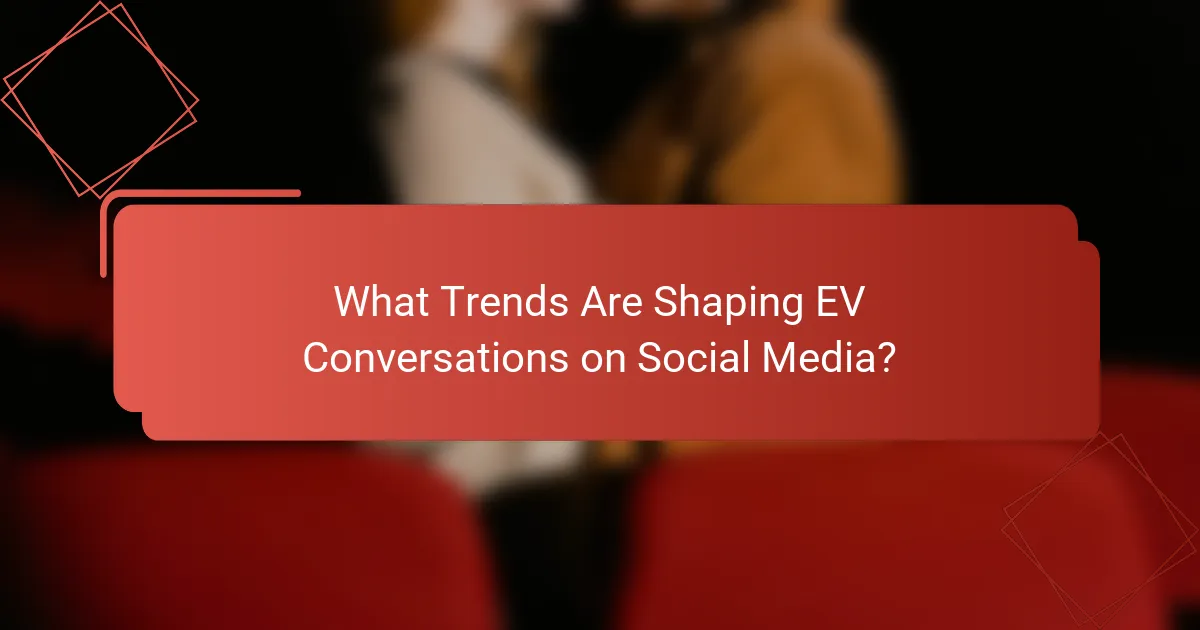
What Trends Are Shaping EV Conversations on Social Media?
Social media is increasingly influencing perceptions of electric vehicles (EVs) through various trends that drive discussions and engagement. Key trends include the rise of sustainability dialogues, technological advancements, and government policies that promote EV adoption.
Rise of sustainability discussions
The growing emphasis on sustainability is a major trend in EV conversations on social media. Users are increasingly sharing content that highlights the environmental benefits of electric vehicles, such as reduced emissions and lower carbon footprints.
This trend is fueled by a collective awareness of climate change and the desire for greener alternatives. Brands and influencers often engage with their audiences by promoting eco-friendly practices and showcasing how EVs contribute to a sustainable future.
Technological advancements in EVs
Technological innovations are a significant focus in social media discussions about EVs. Topics such as battery efficiency, charging infrastructure, and autonomous driving capabilities are frequently highlighted, attracting attention from tech enthusiasts and potential buyers alike.
Social media platforms serve as a space for sharing updates on the latest advancements, comparisons between models, and user experiences. Engaging content, such as videos demonstrating new features or infographics comparing charging times, helps demystify the technology for consumers.
Government policies and incentives
Government initiatives play a crucial role in shaping EV conversations on social media. Policies that offer tax incentives, rebates, or subsidies for EV purchases can significantly influence consumer behavior and public perception.
Social media users often discuss these incentives, sharing information about local programs and how they can benefit from them. Awareness of such policies can encourage more individuals to consider switching to electric vehicles, further driving the conversation around EV adoption.
